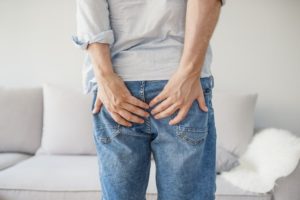 What Is Rectal Pain?
What Is Rectal Pain?
Rectal pain is any pain in the anus or rectum regions of the body. Any minor irritation in this area can feel much more severe because of the large number of nerve endings present in this region. Often, the source of the pain is less severe than the illness itself would suggest. The many causes of rectal pain will be discussed in this article.
Reasons for Rectal Pain
Minor injury or other trauma
Minor injuries or traumas to the anus can occur in a number of different ways but are most often from anal sexual activities alone or with a partner. You may also sustain a minor injury to the rectum after a hard fall or trauma to this area during a physical activity. Indications of trauma to the rectum include bleeding, swelling, and difficult or painful bowel movements.
Hemorrhoids
Advertisement
Hemorrhoids affect up to 75 percent of adults at one time in their lives, making it one of the most common causes of rectal pain. Hemorrhoids can develop both internally and externally, and the pain will be localized to the area surrounding the hemorrhoid, which can appear as a bump or a cyst near the anus or inside the rectum. Other symptoms caused by hemorrhoids include itching, swelling, and difficult bowel movements.
Also read: Natural remedies for hemorrhoids
Muscle spasm (proctalgia fugax)
The rectum is a very powerful muscle and just like other muscles it is susceptible to muscle spasms. When the muscles spasms in the rectum become severe enough to cause pain in the rectum, it is called proctalgia fugax.
Women are twice as likely as men to suffer from this type of muscle spasm and it generally affects 8–18 percent of adults between the ages of 30 and 60. The length of the muscle spasms vary between a few seconds, a few minutes, or even longer. They can come on very suddenly and cause severe pain in the rectal area.
Also read: Top 12 natural muscle relaxers to fix aches and pains
Tenesmus
Tenesmus is cramping in the rectum that can become painful. The condition normally occurs in patients with inflammatory bowel diseases, such as Crohn’s and ulcerative colitis. It can occur in patients without these conditions, however, and in that case is generally due to a motility disorder in the gastrointestinal (GI) tract, like constipation or diarrhea, or a specific bowel movement.
Tenesmus is often characterized by feeling the need to have a bowel movement right after you’ve just had one. It can also require you to strain harder during a bowel movement for a much smaller amount of stool.
Inflammatory bowel disease (IBD)
IBD is an umbrella term for a group of bowel conditions that cause inflammation, bleeding, and pain in the bowel and rectum. It affects millions of Americans. Each condition has a different set of symptoms and will affect individuals differently.
It is also possible for the condition to manifest differently over time. Some common symptoms generally associated with IBD include abdominal pain and cramping, blood in stool, constipation, diarrhea, fever, reduced appetite, and unintended weight loss.
Proctitis
Proctitis is the specific term for inflammation in the lining of the rectum. While it is commonly associated with IBD, it can occur in anyone and has been related to radiation treatments in cancer patients.
Proctitis has been known to cause pain in the rectum, diarrhea, bleeding, and discharge. It is also characterized by a feeling of pressure or fullness in the rectum, causing patients to feel the need for a bowel movement even after they have just had one.
Fecal impaction
Advertisement
Fecal impaction generally occurs after a period of chronic constipation, causing the feces to impact and harden inside the rectum. It is a fairly common GI issue in older adults, although it can occur to anyone of any age. Symptoms of a fecal impaction include rectal pain, abdominal pain, abdominal or rectal bloating, nausea, and vomiting.
If you are experiencing any of the symptoms described for any of the conditions discussed in this article, talk to your doctor or seek medical immediately.
Also read:
